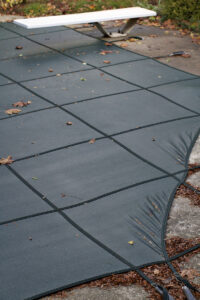
It isn’t always easy to know when to close your backyard swimming pool, so let’s go over some of the signs that it’s time.
As the summer months start to fade away and the promise of fall looms over the horizon, many pool owners face a crucial decision: When is the right time to close their backyard swimming pool for the season? Closing your pool at the appropriate time is essential to prevent damage, save on maintenance costs, and ensure a smooth reopening next year.
Dropping Temperatures
One of the most obvious signs that it’s time to close your pool is the dropping temperatures. As the nights become cooler, the water in your pool will start to lose heat more rapidly, making it less comfortable for swimming. Additionally, when the temperature consistently dips below 70°F (21°C), it becomes challenging to enjoy the water without feeling too cold. Closing your pool before the temperatures plummet is a wise decision to avoid discomfort.
Reduced Usage
If you notice a significant decrease in pool usage, it’s a clear indicator that it might be time to close it for the season. Many families use their pools heavily during the summer, but as school and work routines resume, the pool often sees less action. Closing it allows you to save on maintenance and operating costs while ensuring the pool remains in good condition.
Falling Leaves
The arrival of autumn brings beautiful foliage, but falling leaves can be a nightmare for pool owners. Leaves, twigs, and other debris can quickly accumulate in your pool, leading to water quality issues and potential damage to your pool equipment. When you find yourself spending more time cleaning the pool than enjoying it, it’s time to consider closing it.
Algae Growth
Algae growth is a common problem in swimming pools, especially when the water is not adequately circulated and treated. If you notice green, slimy patches forming on the pool walls or floor, it’s a sign that your pool may need to be closed. Algae growth can escalate quickly and become more challenging to control as temperatures drop.
Decreased Water Clarity
Clear, sparkling water is a hallmark of a well-maintained swimming pool. If you notice that your pool water is becoming cloudy or murky despite regular maintenance efforts, it might be time to close the pool. Cloudy water can be a sign of imbalanced chemical levels or the onset of algae growth, both of which can worsen as the season progresses.
Steps to Properly Close Your Pool
Once you’ve determined that it’s time to close your backyard swimming pool, follow these steps to ensure a smooth winterization process:
- Balance the Water Chemistry: Before closing the pool, ensure that the water chemistry is properly balanced. Adjust the pH, alkalinity, and calcium hardness levels to the recommended ranges.
- Clean and Vacuum: Remove debris from the pool and vacuum the pool floor to ensure it’s as clean as possible before covering it.
- Lower the Water Level: Lower the water level to below the skimmer and return jets to prevent freezing damage. Drain some water from the pool if needed.
- Remove Pool Accessories: Take out any pool accessories, such as ladders, diving boards, and toys, and store them properly.
- Winterize Pool Equipment: Properly winterize your pool equipment, including the pump, filter, and heater, to prevent freezing and damage.
- Cover the Pool: Invest in a high-quality pool cover that fits snugly over your pool to keep out debris and prevent evaporation.
- Regularly Monitor: Throughout the winter, periodically check the pool’s water level and cover to ensure everything remains in good condition.
Do You Have More Questions About Spas? Ask Sunrise Premiere Pool Builders LLC
If you still have questions about how to build a brand new swimming pool, Sunrise Premiere Pool Builders LLC is here to help you. At Sunrise Pools, we can build and install your pool, spa, or hot tub and provide you with pool chemicals, services, and more. If you have questions, feel free to give us a call at 410-349-3852. To see more from us and for tips and tricks, be sure to follow us on Facebook, Twitter, Pinterest, and LinkedIn.
